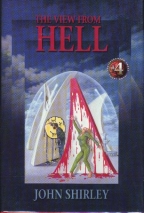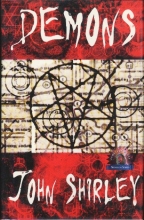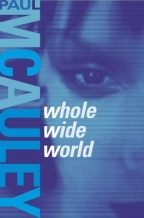|
|
|
Dangerous writing skills enable Mo Hayder to achieve a quantum state between exploitative trash and scary, superior horror fiction. |
|
|
|
The Agony Column for March 4, 2002
Commentary by Rick Kleffel
"I shall not today attempt further to define the kinds of material I understand to be embraced . . . [b]ut I know it when I see it . . . " -- Justice Potter Stewart on obscenity, 1964
Supreme Court Potter Stewart's famous take on obscenity has been so well remembered when the good man himself has been largely forgotten because it gets to much more than simply a definition of pornography. It is an arrow that can launched directly at the heart of art. It has both covered and spawned a multitude of sins. It can never lose its relevance. And every time somebody turns up the volume to 11, someone else puts this arrow in the quiver.
It's not surprising that genre fiction is where writers often decide to turn up the volume. Genre fiction, horror in particular, comes closest to having a mandate to go to the extremes. But no matter how talented they are, writers have to learn that when they go to the extremes, they're going to lose some of their audience. The farther they go, the more readers will fall off the back edge of their train. Going to the extremes also is best seen as a means to an end, not an end in itself.
|
|
|
Dangerous writing skills enable Mo Hayder to achieve a quantum state between exploitative trash and scary, superior horror fiction. |
A recent spate of novels released in the US and the UK certainly manage to go to the extremes, all with varying levels of success. This column came about because I just finished Mo Hayder's 'The Treatment'. Hayder is clearly a talented writer, but this tale of a ring of child molesters shows the dangers carelessly exercising writing skills. Yes, some readers should absolutely not read this book. But even when she is describing the most reprehensible acts, Hayder does so well. However, her ability to shock and distress the reader easily drowns out her talent as a skilled prose writer and creator of characters. That the acts she describes are so repellant is one thing. But the problem isn't that what she's describing is repellant, it's that it becomes repetitive. Shock value does not increase with repeated exposure, even if the shock is enormous, repugnant. And the value of turning the volume up to 15 is not necessarily four times greater than the value of turning the volume up to 11. Hayder's work is strongest when she is describing the result of these horrific acts and not the acts themselves. The character she creates from the horror she describes are unforgettable. This book is worth reading, but it's not the extreme material that makes it so. It is worth reading in spite of the extremes employed by Hayder.
|
|
|
John Shirley's 'Wetbones' is a powerful look at addiction and despair. |
It is possible to go to the extremes -- and even beyond. One writer who has done so successfully is John Shirley. 'Wetbones', originally from Mark V. Ziesing Books, mixes up Lovecraftian monsters, sexual serial killers and crack addiction in an effective look at the many faces of addiction. Though he does treat some of the same subjects as Mo Hayder, and just as harshly, Shirley does so with a skill and style and intent that makes them closer to palatable. That said, I had to start 'The View From Hell' from Subterranean Press three times before I could get past the first few pages. But Shirley uses science fictional devices and techniques to help distance the reader -- ever so slightly -- from the horrific acts that humans are capable of. 'The View from Hell' follows some discorporated entities as they drop in on earth and tour the terrors of being human. Not content merely to observe, they begin to influence those activities. Then they begin to experiment. Those who have fond memories of reading Robert Heinlein's 'Goldfish Bowl' when they were but wee lads and lassies will find this much more severe and adult take on the same idea extremely terrifying and satisfying reading.
 |
|
John Shirley's 'The View From Hell' absolutely, 100% lives up to its title. |
Shirley succeeds at excess for some obvious reasons. 'The View from Hell' is a novella, a mere 193 small-format pages. Shirley doesn't overfill the book with overkill and repetition. Most importantly, his science fictional techniques allow the reader to both experience the horrific details and pull back for the wider view. He uses the genre to do precisely what all good fiction is supposed to do -- to re-envision the real world through a fictional lens, gaining a perspective on matters that would otherwise be unobtainable.
 |
|
I'm not sure if there are any copies of this book left, but if there are, and if you think that you'd like a novel about hideous demons who torture, kill and eat humans, then you'd better buy it up pronto. |
In 'Demons', first available as a Cemetery Dance novella, and now available from Tor (with new material) Shirley takes a similar tack. One day, for no at first discernable reason, huge, monstrous creatures -- demons -- appear from nowhere in our world and begin terrorizing, torturing and killing humanity. They can't really be stopped. They just have to be lived with. It's surprising what humanity can get used to. Like 'The View from Hell', 'Demons' in its original form benefits from brevity. It also benefits from Shirley's gonzo willingness to go the whole route, to show demons doing to humans in plain sight what humans do to one another behind closed doors. Shirley also lulls the reader and risks the same kind of boring repetition that one encounters in 'The Treatment'. But just when you think that the story is going to degenerate into a pointless monster festival, Shirley starts to suggest that he's going to reveal why this is happening. From that point on, the reader cannot turn the pages fast enough to find out what Shirley's very clever mind has conceived. I haven't read the longer version from Tor, though I probably will at some point. However, in its original conception, 'Demons' plunges deep into excess, wallows in it, risks repetition then pulls back and delivers a thought-provoking conclusion. That's enough for this reader.
 |
|
Paul McAuley views a little cyber-snuff porn in the prescient near-future thriller covering the 'Whole Wide World'. |
Though he does not operate in quite as excessive a mode as Shirley and Hayder, Paul McAuley bumps up against the edges of what some readers will tolerate in 'Whole Wide World'. Like Hayder, McAuley employs a mystery format to pursue ugly, ugly humans. But like Shirley, he does so with some science fictional techniques -- barely. McAuley's novel takes place in the very near future, presciently imagined by the writer as reeling from the aftermath of terrorist attacks. Counter measures have been enacted to prevent further acts of terrorism. Surveillance cameras hang on every corner in London, connected to one another through an AI-enhanced network. Don't expect any William Gibson cyberpunk extravaganzas here, however. McAuley's future is already our present, and in our present we don't have to worry about stinking AI's on the net. No, cyberporn and performance-art snuff-film webcasts are as far as McAuley needs to go. For a certain segment, again, it will be too far. But McAuley weaves tiny screen captures from the extremes into a 21st century mystery. The primary audience of hard-boiled mysteries like 'Whole Wide World' is male, and given the content, it's likely to remain so. McAuley's journey to the extremes is going to leave some readers behind. Those who manage to hang on to 'Whole Wide World' will be rewarded with much more than the sum of the parts of it that virtually portray virtual sex and violence.
|
|
 |
|
The US edition of Clute's radical meta-SF novel has the same words as the UK version, but... |
Readers may be hard pressed to grok that the UK version of 'Appleseed' was actually published in the English language. |
John Clute, in 'Appleseed', pursues a very different set of extremes than Shirley, Hayder or McAuley. Clute, a respected critic and co-author of 'The Encyclopedia of Science Fiction', does pepper his book with enthusiastic and unusual bouts of sex, or something remotely resembling sex. But Clute pursues his extreme not in content, but in form. 'Appleseed' is as close to a 23rd century work of fiction as you are likely to find in your current bookstore. Like the other literary geniuses who wanted tell stories of ultra-violence and ultra-sex, he's found a new language in which to do so. He's also discovered that, to the 20th century reader, aliens from the 23rd century will be more familiar and comprehensible than humans. He passes on his years of insight into the development of the science fiction genre and fiction itself by nearly speaking in tongues. It's an astonishing feat of invention that moves so fast it takes a bit of an effort to keep up with it. You'd want the hypertext version of the book if you didn't love real books printed on real paper so much. When reading Clute's novel, you have the feeling that there are about 50 novels worth of research and invention stashed offstage. This is probably an under-estimate. Of course all this invention helps to make the vaguely smutty stuff, if not more palatable, certainly more difficult to detect. It's like finding the guy who is holding a knife in the midst of a gun battle. In 'Appleseed', Clute demonstrates that the extremes aren't just sex and violence. In retrospect, it seems obvious. The real extreme that all of these novels deal with, in one way or another, is language.
They're just words on paper. We can be thankful of that fact. Books from the extremes demonstrate the best that books can be, even if the works themselves are less than perfect and less than accessible. Mo Hayder may show us more than we want to know, more often than we want to see it, but in doing so she draws some unforgettable characters from the dregs of society. These are the humans you might never see, or read about, and if you did they wouldn't seem human. Hayder shows us the human monsters. John Shirley shows us the human monsters as well, but he allows us to lift ourselves above the fray, to see the carnage from above the battle and understand simultaneously that those are people down there fighting blindly in the trenches. Paul McAuley offers prescient glimpses of the present, from the perspective of the future. The knife-slices of cyberporn cut both ways. And John Clute's 'Appleseed' is something of a culmination of extremes. He takes the tool that other writers use to describe extremes both real and imagined and pushes the tool itself to the extremes. In the mid-twentieth century we learned that language is a virus. Here in the future, we're learning that the susceptibility rate is 100%.
Thanks,
Rick Kleffel